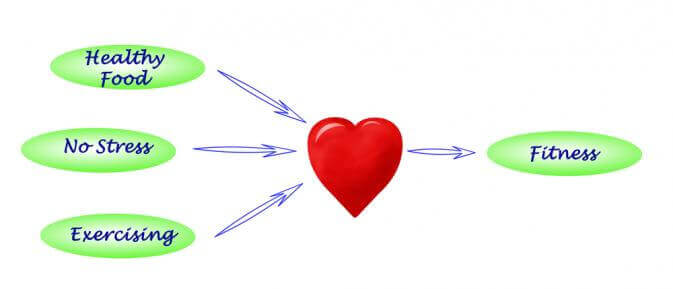Is Exercise Bad For Your Heart?
Get-Fit Guy weighs in on the latest research about whether exercise is bad for the heart or body, how much exercise is too much, and how to know if your heart is healthy enough for exercise. Read on to learn more.
Ben Greenfield
Listen
Is Exercise Bad For Your Heart?

This isn’t the first time I’ve felt my heart rate skip a beat or feel funny during exercise. Recently, in a chapter of a book I wrote entitled Beyond Training, I described how during long workouts leading up to the race, I occasionally experienced a phenomenon called PVC, or Premature Ventricular Contraction, in which the heart’s electrical activity become slightly abnormal during physical exertion.
In extreme endurance athletes such as marathoners and Ironman triathletes, these type of heart issues have even caused death! For example, distance-running legend Micah True – better known for his role as Caballo Blanco in the book Born to Run – died during on a trail run. The cause was cardiomyopathy due to an enlarged heart. True was just one example of seasoned endurance athletes who have experienced sudden fatal cardiac episodes during exercise. Marathoner Ryan Shay and Ironman triathlete Steve Larsen are others, and most recently, professional Ironman triathlete Torbjorn Sindalle was forced into unexpected retirement due to premature wearing of a part of his heart called the bicuspid valve. I list many other such examples in my article Are Endurance Sports Unhealthy?
Of course, the last thing I want to do is scare you away from exercising. After all, in a generally sedentary and increasingly unhealthy and obese society, the last thing most people need to hear is that exercise could kill them! But it is important to at least be aware of the latest research about whether exercise is bad for your heart or body, how much exercise is too much, and how to know if your heart is healthy enough for exercise.
Is Exercise Bad For Your Heart?

This week, a study was released in the Canadian Journal of Cardiology. In the study, a group of recreational marathon runners were observed to undergo significant damage to their heart muscles after a strenuous race.
Now don’t go calling all your marathoning friends or canceling your entry in the local 5K!
Here’s why: These effects were found to be both temporary and reversible. But the researchers warned that these potentially dangerous effects are definitely more widespread in less fit exercisers and that recreational distance runners should be sure to prepare properly for the rigor of something like a marathon.
The professor who oversaw the study summed it up like this:
“Although no permanent injury was observed in this group of runners, the findings suggest that there may be a minimum fitness level needed beyond which the heart can bounce back from the strain of training and running a long race. Furthermore, these results emphasize the need for proper preparation before recreational distance runners engage in a marathon race.”
So although it may seem obvious, the main takeaway is this: Don’t jump into a hard exercise session or a race for which you’re inadequately prepared! By pushing too far outside your comfort zone, you could indeed put yourself into a situation where exercise could be bad for your heart.
How Much Exercise Is Too Much?
Not only do you not need to be scared away from exercise, but you should actually take comfort in the fact that it can make you live longer. In the episode Is Running Bad For You?, I describe how a large study showed regular jogging to increase the life expectancy of men by 6.2 years and women by 5.6 years.
Not only do you not need to be scared away from exercise, but you should actually take comfort in the fact that it can make you live longer. Regular jogging can increase the life expectancy of men by 6.2 years and women by 5.6 years.
In that same episode, I compare exercise to alcohol intake, pointing out the fact that while there is indeed significant research to show that too much drinking or too much running may actually be dangerous for you, the occasional glass of red wine or moderate amounts of jogging appears to significantly extend your life. Ultimately, exercising more than 90 minutes a day is where the “law of diminishing returns” seems to kick in. At that point, you’re not doing yourself any additional benefits. Instead, you’re risking joint breakdown or heart stress, and it simply doesn’t make sense unless you’re a professional athlete, bodybuilder, or really, really enjoy spending lots of time in a gym.
In the episode Can You Exercise Too Much?, I also give you a few quick tips to know if you’re overdoing exercise, including:
- You’re always sore or get injured frequently.
- You have trouble sleeping or are constantly fatigued.
- Your morning resting heart rate gets consistently higher.
- You sacrifice family, work, or personal obligations to exercise instead.
How to Test Your Heart for Damage
Finally, you may be interested in determining whether or not you’ve done any damage to your heart if you’ve ever engaged in significant, excessive or strenuous exercise in the past. Just 3 weeks ago, I went into my local cardiac facility and underwent two procedures that you could easily do in your local hospital or cardiac center. Unless you’ve been diagnosed with heart issues by a doctor, you’ll need to pay the majority of costs for these tests out-of-pocket, but they may be worth the peace of mind for you.
The two tests were:
- An exercise electrocardiogram, also known as a stress ECG, which provides information about how the heart responds to exertion. It usually involves walking on a treadmill or pedaling a stationary bike at increasing levels of difficulty, while your heart’s electrical activity, heart rate, and blood pressure are monitored. This test is especially good at detecting PVCs or other arrhythmias.
- A transthoracic echocardiogram, which is a heart test similar to an X-ray, but without the radiation. The procedure uses the same technology used to evaluate a baby’s health before birth (aka, an ultrasound). A hand-held device called a transducer is placed on the chest and transmits high frequency sound waves which bounce off the heart structures, producing images and sounds that can be used by the doctor to detect heart damage, wall thickness, heart size, valve function, or significant scarring. This test will only show areas of serious damage, not the less significant, mild scarring you may have from endurance exercise.

If you have more questions about whether exercise is bad for your heart, then leave your comments, thoughts and questions over at Facebook.com/GetFitGuy!
Heart health and man running images courtesy of Shutterstock.

